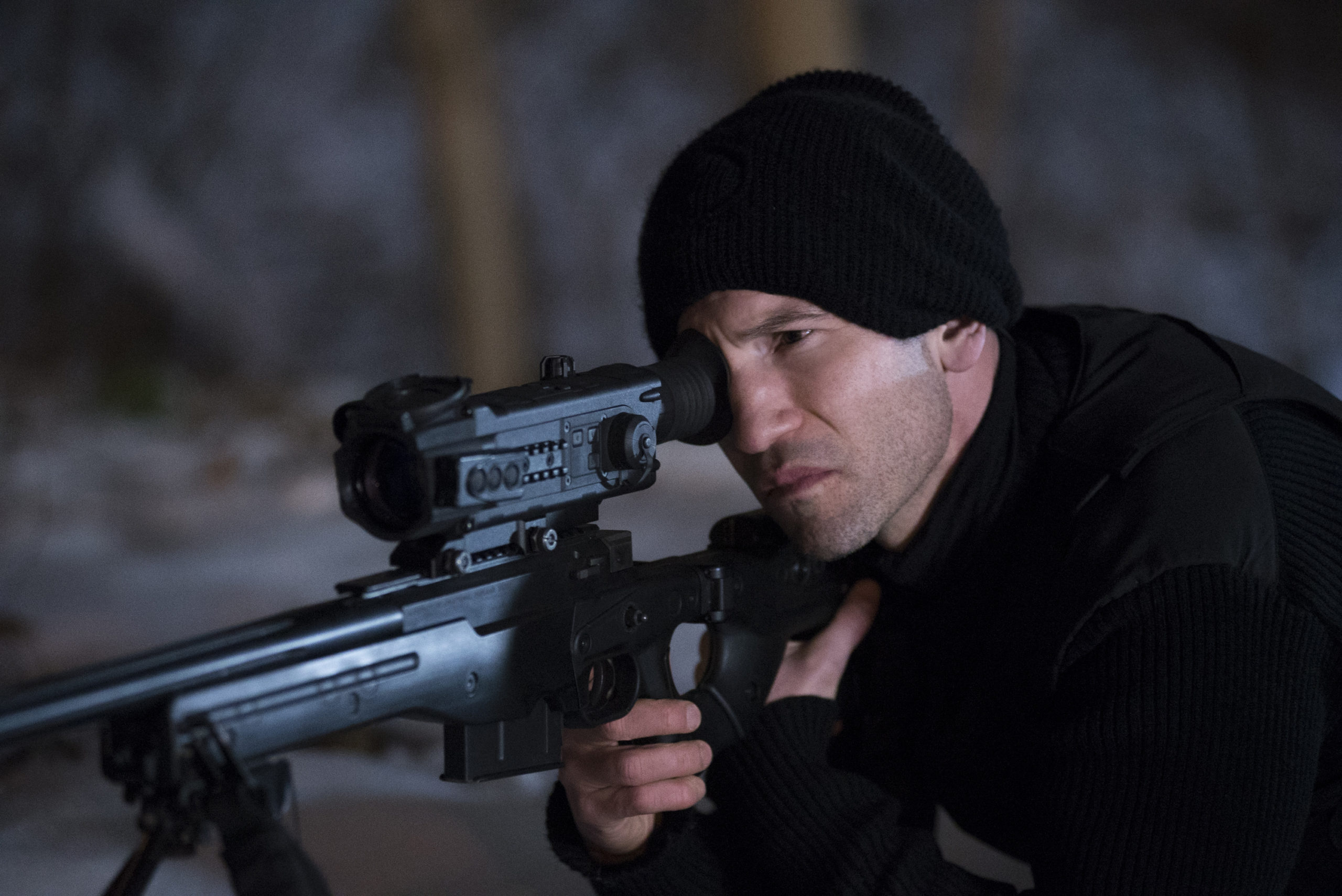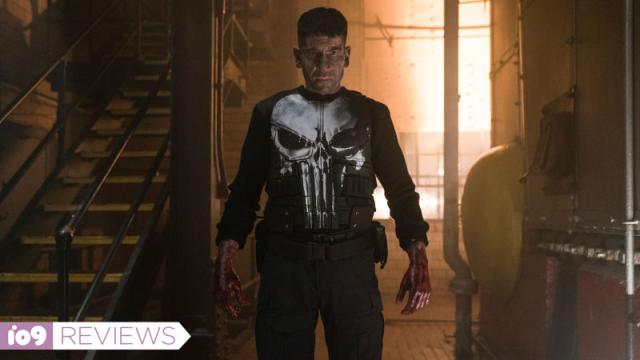The last time we saw Frank Castle (Jon Bernthal) in Marvel’s Cinematic Universe, he’d fully embraced his Punisher persona and taken to doling out his personal brand of justice even after he’d killed the people directly responsible for the death of his family. It’s interesting, then, that that man is not the Frank Castle we meet in the opening moments of Netflix’s The Punisher.
Set some time after the second season of Daredevil, but before Defenders, The Punisher‘s New York City is still reeling from the highly-publicized The People v. Frank Castle trial and the seeming death of the Punisher. Frank Castle moves through the shadows, skulking and observing and plotting because while he isn’t the explicit Punisher that he was at the end of Daredevil, he’s still very much a man on a mission that drives him to kill.
Whatever justice Castle exacted as the Punisher was not enough to sate his drive to root out evil in the world. The Punisher is yet another story about Castle desperately trying to cope with the loss of his family, but it’s also more than that. It’s a story about power and corruption and how we as a society often fail our veterans when they return from the battlefield. The Punisher does a lot of interesting work to frame Castle as a man who’s been wronged by multiple systems of power that refuse to see him as human. But the series never gets around to asking us to think about who a character like the Punisher is and what all he stands for outside of its perfectly constructed narrative that regards him as a hero.

While watching The Punisher‘s first episode, I kept asking myself whether Marvel and Netflix made the right decision when they canceled a scheduled screening at New York Comic Con. At the time, we were only a few days out from the shooting in Las Vegas that left 58 dead and hundreds more injured.
There are no scenes of Frank Castle opening fire into a crowd of unsuspecting concertgoers with a semi-automatic rifle, but he does put a bullet through a man’s head from across the US/Mexico border. Castle doesn’t storm a gay nightclub and begin executing in a blind rage, but he does strangle a man in an airport bathroom stall while a pair of other men listen on and make homophobic jokes that would make Larry Craig narrow his stance. Castle doesn’t storm a church and murder those worshipping inside of it, but he does run a man over with a car while staring forlornly at a photo of his dead wife and children.
The Punisher knowingly breaks up these three murders by placing them in different places and times and demonstrating the versatility of Castle’s deadliness. Castle, these establishing shots inform us, is a ghost with the unfinished business of hunting down even more criminals connected to the deaths of his family. But if “Castle has unfinished business” is The Punisher‘s general up-beat, then its down-beat is something a bit more complicated that the series is never quite able to put its finger on. More than once, but especially in that opening sequence, The Punisher seems to be trying to convince you of a maxim that it isn’t entirely sure is true: “Frank Castle is a murderer, not a mass shooter,” it insists. “Frank Castle is a murderer, not a mass shooter.”
Though he’s still out and about killing folks, Frank Castle is at least trying to live something closer to a normal life when we find him after The Punisher‘s opening credits. Now that the world assumes he’s dead, Castle’s found a blue-collar job doing gruelling construction work that mainly consists tearing down walls with a sledgehammer. Castle’s refusal to speak or engage with his coworkers beyond a dead-eyed stare here or the slightest of nods there leads to his being singled out as an oddball, something he’s fine with so long as he’s left alone with his thoughts.
We’re repeatedly made privy to those thoughts through a series of dreams and flashbacks Castle has about his family and the life they had together before everything fell apart. We see Frank gazing at the Statue of Liberty and telling his son not to use racial slurs against Middle Eastern people. Frank’s mind surfaces memories of wife Maria drawing him out of bed with the promise of breakfast and all of the time they finally have to be together. But these dreams morph into dark nightmares over and over that always end with Frank, wide awake and forced to remember that they’re gone.
It’s this psychological torture that pushes Frank to continue digging deeper into the circumstances of his family’s deaths and eventually sets off one of the larger of The Punisher‘s many interconnected threads. Though Daredevil set up the idea that Frank’s family were merely the victims of a gang-related shooting, The Punisher goes full conspiracy theory. Frank Castle’s solo show ties the shooting back to his days in the Marines and a mysterious cover-up orchestrated by his superiors.
Frank’s time in the military is an integral part of his backstory in the comics that’s a welcome addition to his characterization in the MCU. In those flashbacks to his deployment, Frank is still hardened by war, but he’s also a freer man much more capable of building relationships with people. We see Frank bonding with fellow enlistees like Billy Russo (Ben Barnes) and earnestly believing he understands his place within the grander power structure of the armed forces.
When Frank discovers that his beliefs were wrong, he’s put on downward spiral that encapsulates The Punisher‘s message about how the military uses and abuses soldiers before bringing them back home only to discard them. While Frank’s off hunting down the corrupt forces who hurt him, a number of his fellow vets including Russo and Curtis Hoyle (Jason R. Moore) spend much of their time in a veteran’s support group where they attempt to piece their lives back together. The group is both a safe space for the vets (who each echo aspects of Frank’s personality in one way or another) to express their feelings, but it’s also The Punisher‘s Greek chorus.
Scenes of Frank stalking and demolishing faceless enemies are interspersed with moments from the group’s discussion about the sorts of hardships vets face once they return from the battlefield. As things like access to veteran healthcare services and the idea of bringing war home inside one’s self are all picked apart by the group, The Punisher highlights how we as a country are all too willing to break people in pursuit of war without giving thought to how to put them back together or even protect them in the first place.

These ideas are sharp and elevate The Punisher, but the show never really tries to make sure that we understand how the group vets’ and Frank’s pain are the same. The physical and narrative distance between Frank and the group is symbolic of the fact that a stronger support network might have prevented the creation of the Punisher, but that’s an idea that deserves to be much more than subtext.
Instead, Frank’s story brings him together with hacker David “Micro” Lieberman (Ebon Moss-Bachrach) and Department of Homeland Security agent Dinah Madani (Amber Rose Revah.) Castle, Micro, and Madani slip into a complicated game of cat and mouse as all three of them brush up against different sides of a larger conspiracy none of them can suss out on their own. At times, they are at odds with one another, but it’s within each other’s orbit that they each find their personal paths toward justice.
Frank’s path is bathed in the blood of dozens of people as he does away with some of the MCU’s most gruesome fight sequences. There’s plenty of shooting, yes, but there’s just as much stabbing and cracking of bones, expertly textured with foley effects that emphasise what exactly you’re seeing.
Compared to all of Netflix’s other Marvel shows, The Punisher is by far the most invested in selling its fantasy as reality. Frank Castle is a man who’s rubbed elbows with superheroes who fight undead ninjas, but he’s also an everyday man who enjoys diner food and a good book every now and then. You’re not just meant to see Frank as human, you’re meant to see him as exceptionally relatable, which is an issue because The Punisher is largely uncritical of the man in a way that feels meaningful.
The Punisher is not real, but he does exist within our world as a complicated symbol that has taken on a number of meanings, some of them incredibly dark. Try as it might, The Punisher cannot entirely disassociate itself from the Punisher who does open fire into groups of people he’s deemed unworthy the same way a mass shooter might. The MCU’s Frank Castle does not fully embrace the almost unimaginable hyper-violence that defines Marvel’s Punisher comics, but instead presents us with a version of that violence that reads as “realistic” for a comic book TV show.
A general sense of relative realism compared to Marvel’s other shows has defined Netflix’s programming, but with The Punisher, that commitment to making things feel rooted in a world so similar to our own is a misstep. The Punisher isn’t at all interested in telling a story about superheroics or how its titular hero has taken on a cultural significance outside of comics, television, and film that’s tied up in American gun worship and white male rage. Instead, the series cherry picks heroic things about Castle to highlight while emphasising things about the Punisher that are negative in other characters.
The Punisher is better and more thoughtful than the early trailers would have had us believe, which is a welcome surprise. But it’s still not as good or as thoughtful as it needs to be right now, in 2017, given all the baggage that accompanies a superhero whose power is basically a willingness to play judge, jury, and well-armed executioner.
